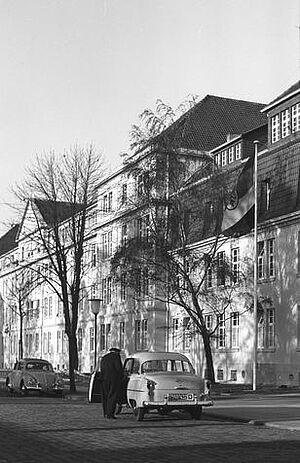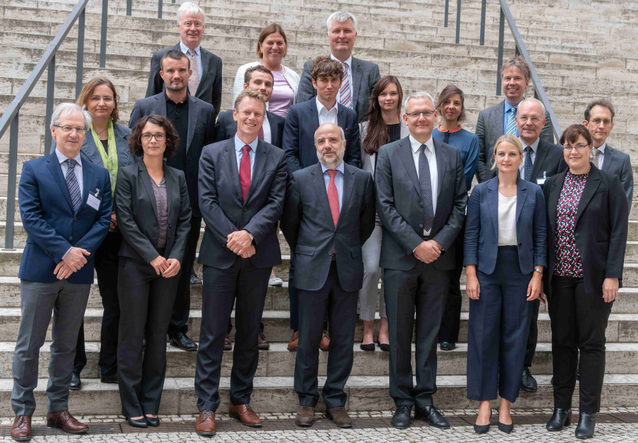- The Institute
- Research
- Dictatorships in the 20th Century
- Democracies and their Historical Self-Perceptions
- Transformations in Most Recent History
- International and Transnational Relations
- Edited Source Collections
- Dissertation Projects
- Completed Projects
- Dokumentation Obersalzberg
- Center for Holocaust Studies
- Berlin Center for Cold War Studies
- Publications
- Vierteljahrshefte
- The Archives
- Library
- Center for Holocaust Studies
- News
- Dates
- Press
- Recent Publications
- News from the Institute
- Topics
- Munich 1972
- Confronting Decline
- Feminist, Pacifist, Provocateur
- Der Mauerbau als Audiowalk
- Digital Contemporary History
- Transportation in Germany
- Envisaged Futures at the End of the Cold War
- From the Reichsbank to the Bundesbank
- German Federal Chancellery
- History of Sustainabilities: Discourses and Practices since the 1970s
- Changing Work
- Democratic Culture and the Nazi Past
- The History of the Treuhandanstalt
- Foreign Policy Documentation (AAPD)
- Dokumentation Obersalzberg
- Hitler, Mein Kampf. A Critical Edition
- "Man hört, man spricht"
- Dates
- Press
- Recent Publications
- News from the Institute
- Topics
- Munich 1972
- Confronting Decline
- Feminist, Pacifist, Provocateur
- Der Mauerbau als Audiowalk
- Digital Contemporary History
- Transportation in Germany
- Envisaged Futures at the End of the Cold War
- From the Reichsbank to the Bundesbank
- German Federal Chancellery
- History of Sustainabilities: Discourses and Practices since the 1970s
- Changing Work
- Democratic Culture and the Nazi Past
- The History of the Treuhandanstalt
- Foreign Policy Documentation (AAPD)
- Dokumentation Obersalzberg
- Hitler, Mein Kampf. A Critical Edition
- "Man hört, man spricht"
The Interior Minstries in Bonn and East Berlin Following National Socialism

Beginning in December 2014, the Leibniz Institute for Contemporary History worked together with the Leibniz Center for Contemporary History, Potsdam (CCH) on the aftereffects of the Nazi dictatorship and its ministerial bureaucracy on the Federal Ministry of the Interior and the Interior Ministry of the GDR. The project was led by the two institutes’ directors, Andreas Wirsching and Frank Bösch, and was carried out on behalf of the Federal Ministry of the Interior, Building, and Community. In both West and East Germany, the ministries of the interior represented key political and administrative areas of the government. An in-depth investigation of the ministries with regard to continuities and fractures from National Socialism is thus an endeavor of particular value to the research. For the first time in the study of the Nazi history of ministries and agencies, this project took into account the development of both the West German and East German ministries between 1949 and 1970. The results of the project were published on June 19, 2018 with the title Hüter der Ordnung. Die Innenministerien in Bonn und Ost-Berlin nach dem Nationalsozialismus (“Guardians of Order: The Interior Ministries in Bonn and East Berlin following National Socialism”).
Majority of Federal Ministry of the Interior Staff from National Socialist Bureaucracy
While only a tenth of the ministerial staff had been active at the Nazi Ministry of the Interior, a majority had been a part of the National Socialist bureaucracy. Most of these were jurists in municipal administrations who had begun their careers under the Nazi dictatorship. While many of them received minor posts at first, by 1960, around two thirds of the leading figures at the Federal Ministry of the Interior were former members of the Nazi Party and nearly half were former SA members.
While candidates did have to submit justifications for their previous career paths, they were rarely scrutinized closely. Hence, a number of officials were able to conceal significant parts of their Nazi past. While they adapted to the new democratic order, statist-authoritarian, nationalist and strongly anti-communist ways of thinking often persisted and affected their political work. The research group demonstrated how draft legislation emerging from the Federal Ministry of the Interior failed in a number of areas due to public protests and the opposition of other political bodies and actors – such as plans for emergency situations, journalism rights, and a constitution for a united Germany. Staff members with a Nazi past often pursued a course hostile to Jewish minorities, representing a continuation of ways of thinking that were partly common before 1933. Public opposition arose as a result of these cases as well, which in turn fostered the democratic process of learning and adaptation on the part of the administrations.
Long-time Communists and Young Cadre at the GDR Interior Ministry

While the West German Federal Ministry of the Interior adhered to the traditional base of civil servants, its counterpart in East Berlin underwent a complete overhaul to boost the influence of the ruling SED party. Long-term communists and young officials without a tainted past took on leadership positions. Despite the mostly inexperienced personnel, the East German Interior Ministry was soon able to build up a police administration and bureaucracy that would safeguard the power of the SED. In the mid-1950s around a tenth of leading officials there were former Nazi Party members. In some administrative areas, however, the ministry did make use of experts who had had careers during the Nazi era. Just under a third of leading figures in the archive department were, for example, former Nazi Party members.
Retrospectively, the effects of the different ways of dealing with the past were paradoxical: West Germany formed a democracy using personnel with a Nazi past, while East Germany created a dictatorship with new, untainted officials. The fact that both new beginnings were successful in accordance with the logic of their respective systems ultimately speaks for the adaptability of the ministerial bureaucracies.
Comprehensive results of the study available for download: [pdf-Datei]
The 830-page illustrated volume entitled Hüter der Ordnung. Die Innenministerien in Bonn und Ost-Berlin nach dem Nationalsozialismus (“Guardians of Order: The Interior Ministries in Bonn and East Berlin following National Socialism”) was published first by the Wallstein Verlag and later by the Bundeszentrale für politische Bildung.
In addition to the project heads, the research group was composed of six post-doc and two doctoral students. An academic board, formed in October 2015, supported the group with its expertise. A steering group, composed of researchers from both institutes, also guided the project.
Further information on the research project can be found on the website of the research group at www.geschichte-innenministerien.de (in German).
Further Projects
- Dr. Frieder Günther: Cultures of Administration: The Reich Ministry of the Interior, the Federal Ministry of the Interior, and the Interior Ministry of the GDR between Continuity and Political System Dependence, 1919-1975
- Dr. Lutz Maeke: Revolution as a Career? On the Biography of the First East German Interior Minister, Carl Steinhoff
- Dr. Maren Richter: Biographical Study of Maria Daelen
- Irina Stange M.A.: The Personnel Policy of the Federal Ministry of the Interior and its First State Secretary, Hans Ritter von Lex
Mitarbeiterinnen und Mitarbeiter (IfZ)
Dr. Frieder Günther, Dr. Lutz Maeke, Dr. Maren Richter, Irina Stange M.A., Johanna Mattern B.A.

Project membrs at the Center for Contemporary History (CCH):
- Dr. Franziska Kuschel: The Administration of Security: The Interior Ministry of the GDR
- Stefanie Palm: The Federal Ministry of the Interior and the Policy of Media Control after National Socialism
- Dr. Dominik Rigoll: Internal Security in Germany: The Long Path to “Streitbare Demokratie” – a Democracy with Strong Safeguards
- Martin Diebel: Security in Emergencies: The Federal Ministry of the Interior in the Conflict over the Emergency Acts, 1949-1968
Steering Group at the IfZ:
- Prof. Dr. Magnus Brechtken
- Prof. Dr. Dierk Hoffmann
- Prof. Dr. Johannes Hürter
- Prof. Dr. Michael Schwartz
- Prof. Dr. Hermann Wentker



